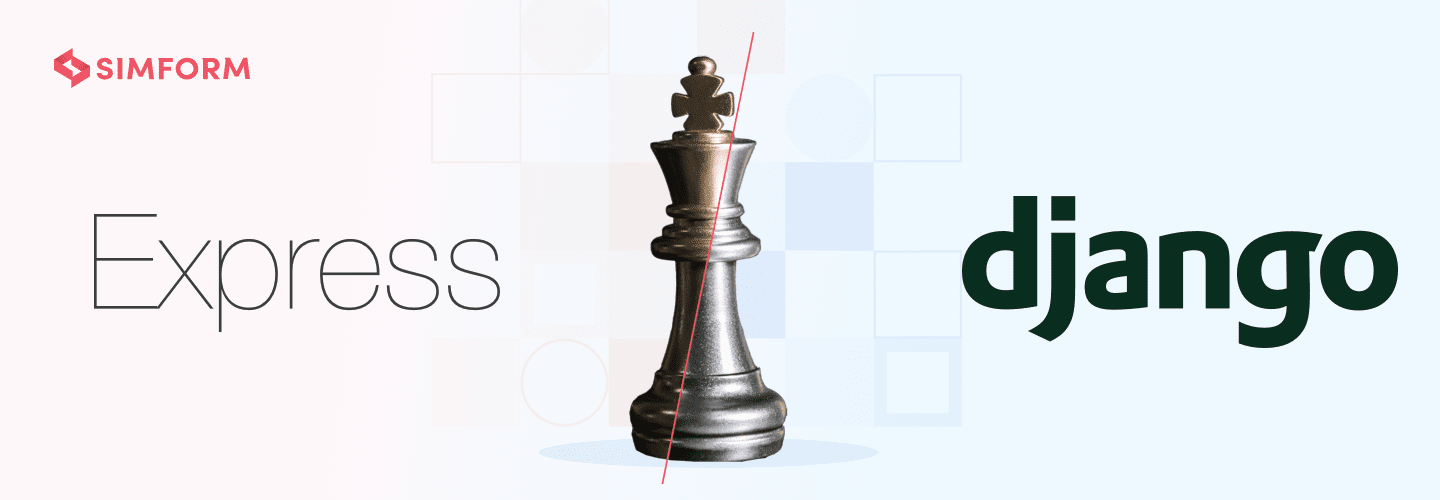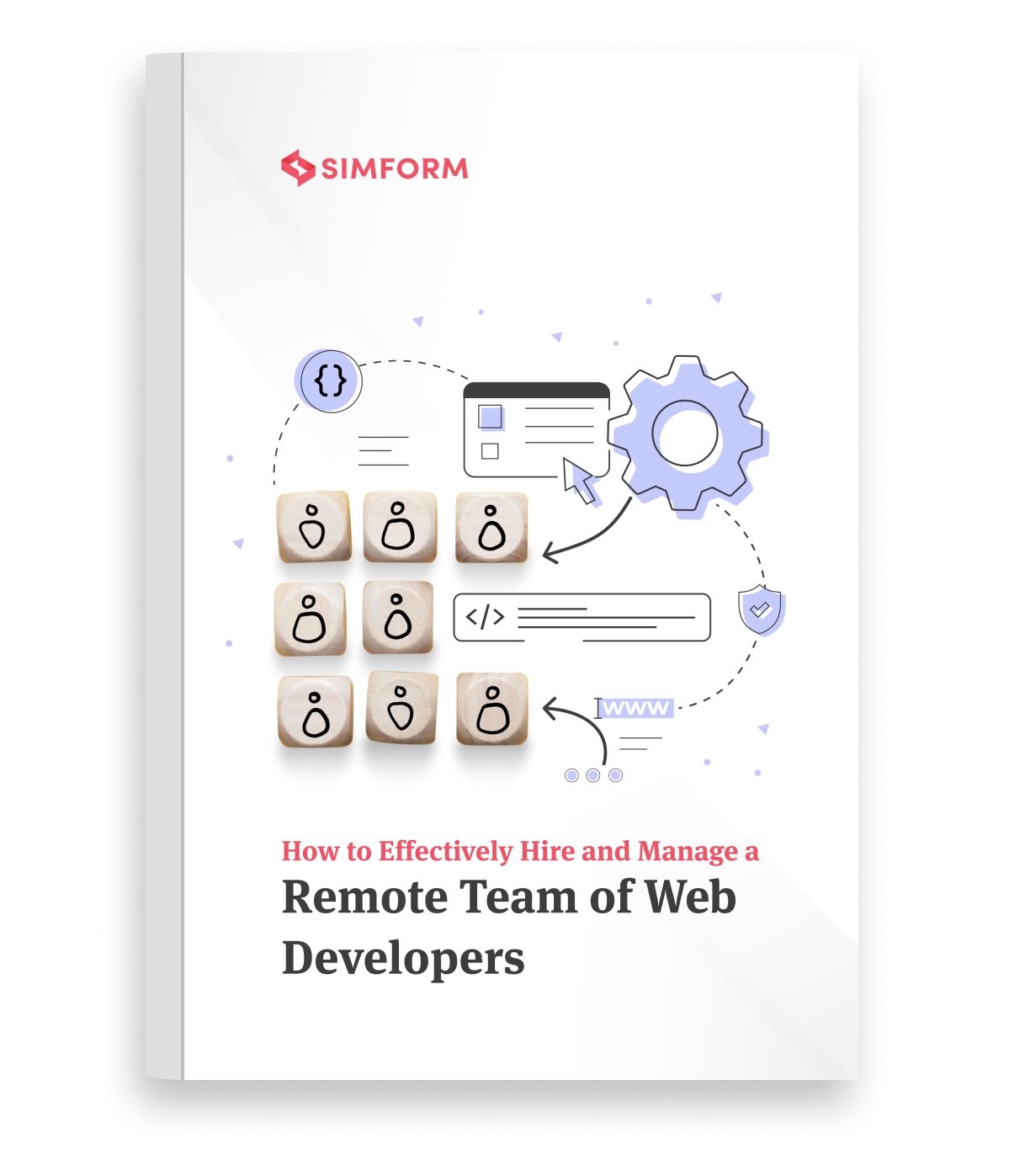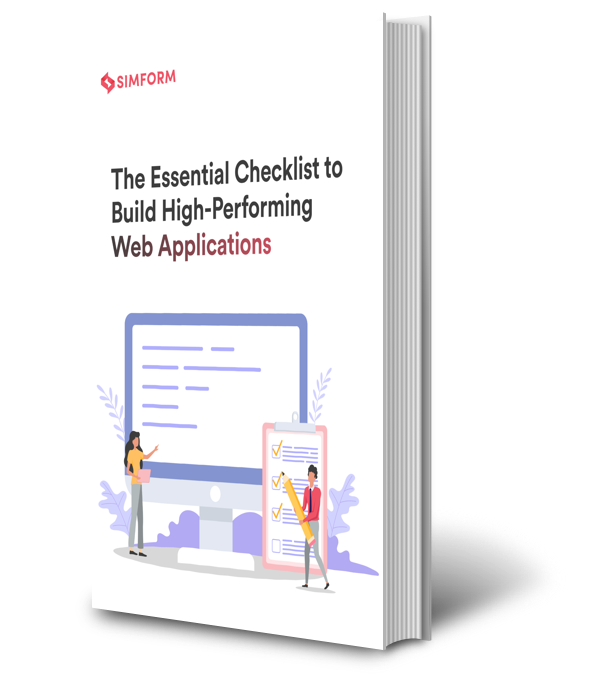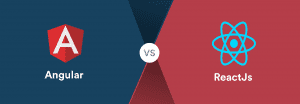Express vs. Django: 10 Indicators to Choose the True Backend King
When you develop a web application, many different questions may come to your mind, especially regarding the backend like,
- How scalable is the backend framework?
- Can you test it quickly, or do you need special testing tools?
- Whether you can easily find skilled professionals with knowledge of the framework?
- What impact will that framework have on the scalability of your application?
Finding the answer to these questions can help you figure a suitable backend framework for your projects.
We understand your dilemma, and hence, in this post, we’ll compare two of the most popular backend frameworks: Express vs. Django.
Editor’s note: Here, Hiren discusses both frameworks in detail based on performance, scalability, testing capabilities, and much more. We hope this will enable you to decide which one to pick for your projects and if you require assistance, feel free to consider Simform’s custom web application development offerings.
Overview of Frameworks – Express vs. Django
What is Express? – An Overview
Express.js or Express is an open-source server-side framework built for Node.js. Written in Javascript, it is part of MEAN, MEVN, and MERN stacks. Express provides plugins, template code, middleware packages, and routing functionality for faster and efficient web development. Additionally, the framework allows third-party integrations of libraries and features to make customization easier.
Market Usage Statistics
- A study by BuiltWith shows that Express is the 10th most popular framework in the Top 10k sites.
- SimilarTech reports around 247,435 websites are built with Express worldwide, out of which 48,855 are made exclusively in the US.
- According to a study by Statistics & Data, Express ranks 4th among the top 5 backend frameworks for 2022.
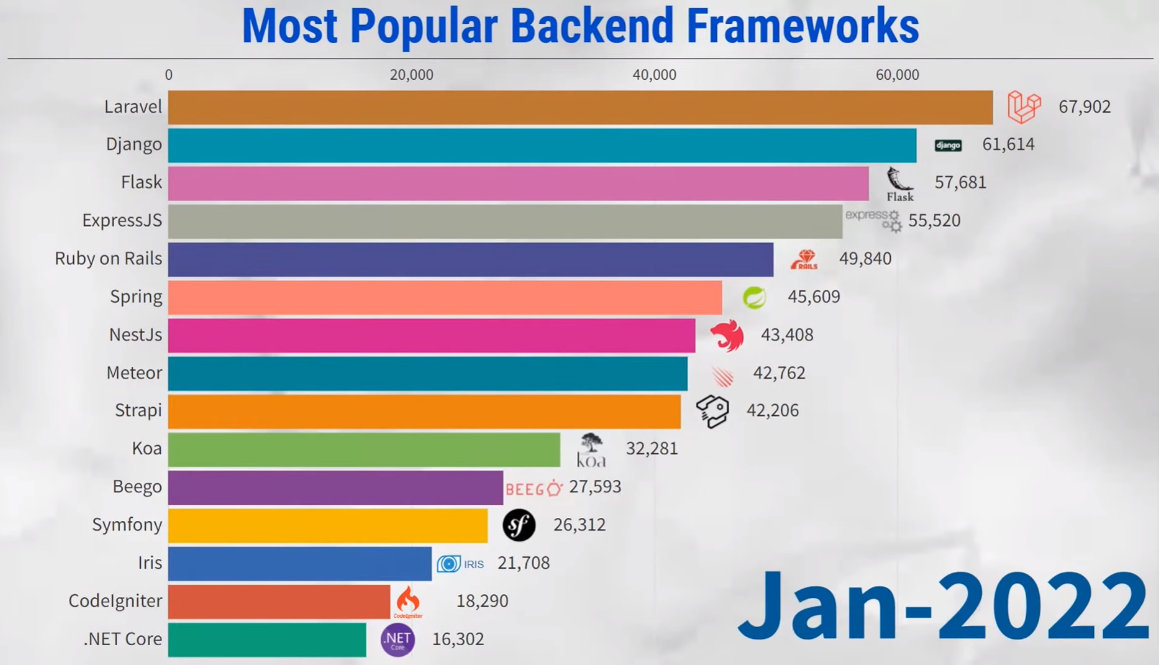
Use Cases
- Single-page apps
- Reusable apps
- Middleware Applications
- RESTful APIs
- Serve and access static files using a browser
- Enterprise web applications
- eCommerce web applications
Popular Apps
- Twitter moved to Node.js Express in 2017 to speed up its mobile web app Twitter Lite.
- Uber utilized Express to develop their base web server, Bedrock, and optimize the middleware to provide security, internationalization, and other integrations for its infrastructure.
- Accuweather leveraged Express to build APIs for integration into other apps
- IMDB also applied Express features to create APIs for developers to integrate them into their apps.
What is Django? – An Overview
Django is a popular web framework written in Python. This free, open-source framework was first introduced by two web programmers, Adrian Holovaty and Simon Willison, working at Lawrence Journal-World newspaper to develop applications. Named after the famous guitarist Django Reinhardt, its development began in 2003 while the first milestone release came out in September 2008.
Django facilitates faster and secure builds and frees the developer from mundane web development tasks, negating the need to create solutions from scratch. With multiple out-of-the-box features, it lets you create complete applications. It goes well with all kinds of websites and supports multiple formats (HTML, RSS feeds, JSON, XML, etc.). Additionally, Django comes with various security features and is ridiculously easy to scale.
Here are some cool usage stats for Django:
- It is a popular Python-based web framework with more than 23,000 watchers and 63.9K stars on Github.
- It powers 84,466 websites used across 54,014 unique domains.
With 7.19% of projects coming from the domain, Science and - Education is the most popular industry vertical using this framework.
Use cases of Django
- Web applications with ORM support
- API backend
- Scalable apps
- ML integration
- Data-driven apps
What popular apps are built using Django?
- Disqus a blog comment hosting service handles 50 million monthly comments and 17-billion monthly pageviews from 2-billion monthly unique visitors hailing from 191 countries. The entire project was built on Django from scratch and has scaled with ease ever since its inception.
- Spotify shares its vast music library with millions of users across the globe while rocking a swift backend and machine learning features simultaneously.
- Mozilla switched to Python and Django for all its newer components to better handle the daily increase in traffic and API.
- Dropbox added an array of features such as user history, synchronization accounts across different devices, add various file-sharing options, and so on.
- Instagram leverages Django to scale with its continuously growing traffic and usage while retaining the simplicity of its UI/UX.
Express vs. Django— Pros and Cons
Pros of Express
- Lesser Development Time: Express uses Javascript for both backend and frontend development. Thus, developers can generate codes faster without the need to learn a new language.
- Effective Error Handling: Express’s middleware is built to support catching errors in synchronous and asynchronous codes.
- Handling I/O Requests: Express is an excellent choice for businesses that receive thousands of requests and notifications from users daily.
- Unopinionated Framework: Express has no strict rules on dealing with specific tasks, and you can leverage middleware packages and components in any way convenient for you.
- Easy Installation: Being a minimalistic framework, Express is easy to install, set up, and has a steep learning curve. This characteristic makes it suitable for beginners with a basic understanding of backend development.
Cons of Express
- Lack of Standardization: While Express does not require a specific structure, it can be an issue as team members increases and developers work on different functionalities of the app. Therefore, it becomes essential for teams to stick to a structure for the entire project.
- Callback Hell: Callbacks are among the most discussed issues with the Express framework as developers fail to comprehend the complicated writing style. However, the Express team has looked into the recurring problem and introduced some relief.
- Philosophy of Middleware: For developers who have never worked with Express, understanding and executing the middleware functions can be tricky.
Pros of Django
- Faster development: Developers can use the batteries-included framework to add functionalities to reduce the development time and shorten the time-to-market.
- Scalability: This presents a lot of opportunities to scale seamlessly and keep up with the growing needs. Additionally, it supports a plethora of websites with millions of users and huge traffic.
- Secure: Facilitates the creation of secure websites and applications and protects them against common attacks such as cross-site request forgery, SQL injections, clickjacking, etc.
- Flexibility: Supports rapid changes during development, thanks to explicit programming and a host of libraries and packages. You can quickly pivot according to market trends while working on Django.
- Machine learning-friendly: Preferred for machine learning algorithms because of their computational and statistical capabilities. You can easily add advanced features to your application and woo customers.
- Rich talent pool: Written in Python, one of the most popular programming languages, its popularity translates into the availability of competent developers and an active community to fast-track the development process.
Cons of Django
- Not suitable for smaller projects: Django is a coding-intensive framework occupying a lot of bandwidth and server processing time. So if you are not planning to scale up the project in the future, you may want to think long and hard before going through all the hassle.
- One request at a time: Unlike other popular frameworks, Django can’t handle multiple requests simultaneously, making it harder for developers to work on the underlying code.
- Slow evolution: Django is also considered to be monolithic. All the modules developed need to be backward compatible, thus slowing down the framework evolution.
Express vs. Django — Performance Comparison
How does Express stand out in terms of performance?
Express is a big hit among developers for the speed it delivers to Node.js applications. In terms of speed, a simple ‘Hello, World’ benchmark performance shows that an Express program can handle 11,202 requests per second.

The developers at PayPal tested two of their apps built with the same functionality to determine their performances: one was developed in Java and the other was built with Express and additional open-source codes. In the end, Paypal found that the app built with Express achieved double requests per second as compared to the Java app, while the average response time for the same page decreased by 35%. Furthermore, the pages were served to the users 200ms faster than earlier.
How does Django stand out in terms of performance?
Django isn’t the fastest framework out there. But then the following question should be— how fast do you want it to be? You might run into a few bottlenecks if you happen to employ Django for the wrong use case. In fact, you may experience a slow down when serializing and deserializing JSON strings, converting database queries into Python objects, and running requests through middleware.
However, you can easily bypass all these possible performance issues by sticking to the best development practices, deploying optimum hardware, and identifying the best areas of applications.
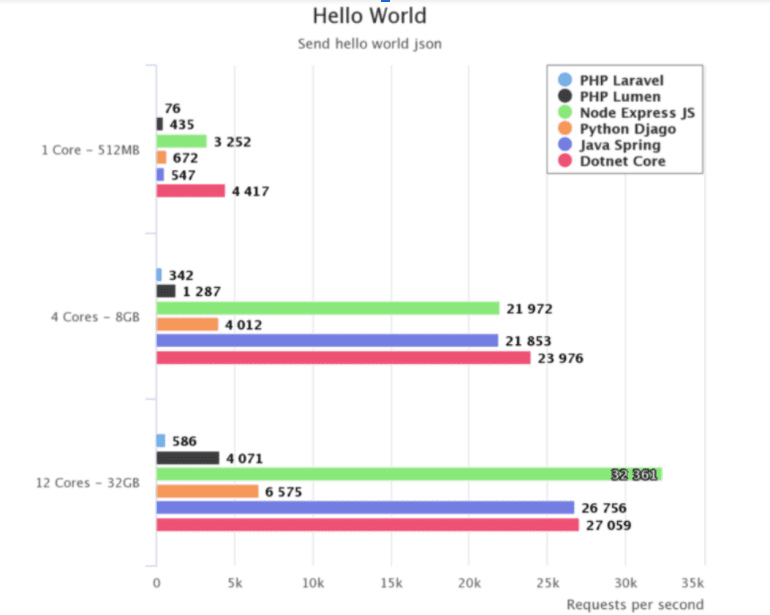
Stack Overflow, and 23,000+ watchers on Github. As a matter of fact, the community is only growing with time, and we can expect to see a healthy amount of activity around this framework in the future. You can easily find various Django enthusiasts on other platforms as well– Discord server with 3,400 members, Telegram group with 6.08k participants, and various thriving Slack channels among others.
Express vs. Django— Application Architecture
What kinds of architecture does Express support?
Express does not require a specific architecture, and developers have the liberty to determine a structure for their web apps. However, MVC (Model-View-Controller) is the preferred and most common architecture type for Express apps.
What kind of architecture does Django support?
It follows the MVT (Model View Template) architecture, which is a slight variation of the widely used MVC (Model View Controller) architecture. A significant difference between the two architectures is that the template file containing HTML and Django Template Language does the controller’s job of facilitating the creation of dynamic websites. Consequently, it gets convenient to manage scenarios where each user is supposed to have a personalized feed, such as on Instagram.
Express vs.Django— Scalability
How scalable is Express?
Express derives various features from Node.js, and one of them is the non-blocking servers that can handle user requests better. As a result, it is easier for developers to create easily scalable web apps. The Express framework is equipped with similar scalability and features as the Nginx and Apache servers. Moreover, being lightweight, leveraging it to build large-scale applications is achievable.
How scalable is Django?
The range of high-traffic Django applications such as The Washington Post, Instagram, Spotify, etc., speaks volumes of the framework’s scaling capabilities. It works flawlessly with various technologies while maintaining optimal performance and loading times. When it comes to scaling, it becomes crucial to optimizing elements like DB, images, CSS, etc., and balancing the load with other resources.
On top of that, you also need to make space for scaling by implementations such as CDN and cloud solutions. If anything, Django facilitates all these operations. It is among the best frameworks to deploy if your long-term plan is to scale up your web application.
Express vs. Django— Ease of Testing
How easier is it to test an Express app?
Similar to Node.js, there are many defined best practices for conducting tests on Express apps. With testing frameworks like Mocha, Jest, Ava, and Postman combined with libraries like Sinon, Chai, and Supertest, you can automate APIs and middleware tests of an Express app.
How easier is it to test a Django app?
Testing is not much of an issue on Django with the array of tools provided to simplify the test-writing process. Moreover, its comprehensive documentation allows you to roll out efficient websites and applications free of anomalies. You can effortlessly test all the layers of logic and come up with a bug-free end product.
Express vs. Django— Microservices compatibility
Is Express compatible with Microservices architecture?
The unopinionated structure of Express makes it suitable to combine with a microservice architecture. This helps to achieve higher scalability and improve performance. In fact, Express Gateway leverages Express.js functionality to build a Microservices API Gateway for organizations to implement a microservice structure for faster development.
Is Django compatible with microservices architecture?
In a word, yes! Features like rapid development, built-in security features, and versatility make Django a fine backend technology for microservices architecture. While Django projects can usually be scaled exponentially, breaking it down into smaller microservices functionalities is a good idea and simpler with this framework. One of the reasons you may want to include Django in one of the microservices is to introduce ML features into your project.
Express vs. Django— Database support
How good is the database support for Express?
Being a minimalistic framework, Express does not come with database integration among its core features and does not promote using any particular database. This feature allows you to connect with a database, whether it’s MySQL, MongoDB, Oracle, SQL Server, or CouchDB, simply by loading a Node.js driver in the app.
How good is the database support for Django?
Django provides official support for PostgreSQL, MariaDB, MySQL, Oracle, and SQLite. While it runs seamlessly with these five databases, it also works well with other database backends by third parties. Additionally, Django gives you the liberty of using multiple databases at a time if the project demands. It’s safe to say that the framework won’t disappoint you while setting up databases for your website or application.
Express vs. Django— Community
How big is the community around Express?
Being one of the most popular frameworks worldwide, the Express open-source community constantly reviews and improves its codes. The Express technical committee meets online once every two weeks to discuss development and maintenance issues, and the meetings are available on their Express YouTube channel. It has 52.6k followers, 145+ releases, and 282+ contributors on GitHub. Express also has a decent following of 5562 members on Gitter with an Express chatroom for discussions related to the framework.
How big is the community around Django?
Django enjoys the perks of a large community around Python. When it comes to raw figures, the Django community has more than 101K members on Reddit, 289,835+ questions tagged in Stack Overflow, and 23,000+ watchers on Github. As a matter of fact, the community is only growing with time, and we can expect to see a healthy amount of activity around this framework in the future. You can easily find various Django enthusiasts on other platforms as well– Discord server with 3,400 members, Telegram group with 6.08k participants, and various thriving Slack channels among others.
Express vs. Django— Hiring developers
How convenient is it to hire Express developers?
Owing to its immense popularity in the backend community, hiring Express developers with extensive knowledge is no challenge. The average hourly cost of hiring Express developers is $35 but it largely depends on the years of experience a developer has gained over the years. Moreover, Express developers are skilled Node.js developers. They have a good understanding of Node.js and find it much easier to work with Express.js.
How convenient is it to hire Django developers?
The large community of developers around Django and an increasing number of skilled Python developers make it easier to hire Django developers. The average hourly rate for Django developers is $61-$80, so you should not find it challenging to find one or some for your projects. With only a few things in mind, such as the portfolio and experience, you should be able to decide upon the right developers for you.
Conclusion
Developing web applications with Express or Django can enhance the entire user experience. Building scalable applications with both frameworks is easy, so a choice between them is difficult. Though which one to choose depends on the kind of projects and specific business requirements.
You can choose Express if,
- You want to scale up your app and handle multiple user requests on the app
- You want to build a real-time application that leverages the non-blocking Express servers.
- You want to build a website where millions of users share and export images similar to Unsplash.
- You want to create an app like GoDaddy for registering domains and offering web hosting services.
- You want to develop a web app like Coursera that provides open online courses.
You can choose Django if,
- You wish to build customizable and dynamic social media websites.
- You want to build ML integrated apps for superior personalization features.
- You wish to build CRM for an eCommerce platform or other high-load booking engines.
- You want to build a secure app for B2B communications.
- You want to build data-driven apps for the travel, food, and hospitality industries.
- You want to build apps that leverage data analysis and visualization.

